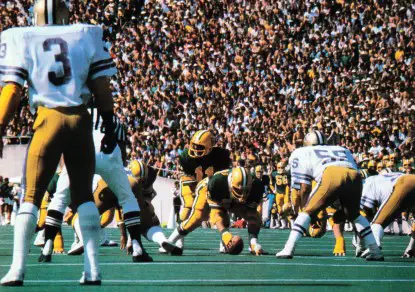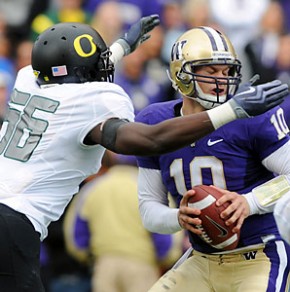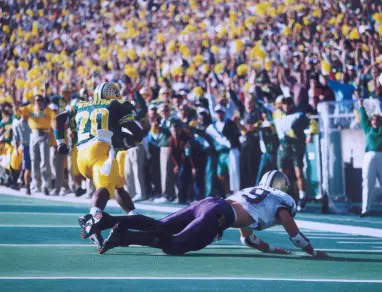As the Ducks and Huskies get ready to renew a rivalry that began in 1900 (with a 43-0 Ducks victory), there is a lot to play for, be it for this year’s squads with bowl and championship dreams, or as another chapter in a more than century-long conflict. Perhaps more than any other program, Washington seems to represent for the Ducks a kind of measuring stick as much as a rival: the lone other Pacific Northwest team with a winning tradition, the one-time Goliath to Oregon’s David that has been surpassed for now yet still has a bigger trophy case.
So after beating the Huskies for eight years in a row going into this game, and having a 13-4 record against Washington since the dramatic 1994 game sealed by Kenny Wheaton’s interception, where does Oregon stand in the long run against its northern rivals?
Even the most hardcore green and yellow partisans among us know that Washington is a proud team with a lot more victories and titles over the 20th century than their neighbor to the south. And though it’s not something we Duck fans like to admit, Oregon’s glory days of the present and recent past have not yet collectively matched the legacy of Washington’s past, particularly the Don James era – although we seem to be catching up quickly.
Yes, Oregon is the defending Rose Bowl champion, and yes the Ducks came within a wrist of winning the national championship in 2010. But Washington has seven Rose Bowl wins in its history and, depending on how you measure it, either one or two national championships. (The Huskies defeated #1 Minnesota in the 1961 Rose Bowl to earn the Helms Foundation national title, but in those days the final AP and UPI polls were conducted on the last day of the regular season.) Oregon may well be on its way to overtaking Washington’s legacy, but there is still more progress for the Ducks to make. We’re gonna need a BCS title and another January bowl win or three to surpass the Huskies in all-time achievement. All in good time, right?
In their 113 years of history against each other, playing almost every season, Washington holds a record of 58-41-5 against Oregon. But that lead was padded by a lot of wins that happened 20 years ago or more. Since 1990, for example, Oregon is 13-8 against the Huskies. Since 1980, Oregon has won 17 games and Washington 15.
Let’s take a look at individual decades since 1945. In the 1940s after World War II ended (play was suspended for the 1943 and 1944 seasons), Washington won three games and Oregon two. In the 1950s, the Huskies admittedly dominated the Ducks, taking all 10 contests. In the 1960s, the first four games were split, but Washington still wound up with a 7-2-1 advantage for the decade. The 1970s followed a similar pattern: each team taking two of the first four, only to have Washington win the rest of the decade, finishing with an 8-2 record against the Ducks. The 1980s again went to the purple and gold, with Washington going 7-3.
But by this time the tide was about to turn. Indeed the Huskies won five in a row between 1988 and 1993, but Oregon winning back-to-back games against Washington in 1987 and ’88 behind quarterback Bill Musgrave (the first set of consecutive Duck victories over the Huskies since 1947-48) was a harbinger of success to come. On October 22, 1994, Kenny Wheaton’s pick-six against Damon Huard didn’t just seal the game for the Ducks or propel the team to the Rose Bowl. It changed the balance of power in the Oregon-Washington series in a way that, 18 years later, hasn’t changed back.
Looking through the list of 104 games over the years, it’s incredible to see the blend of close games and blowouts. Take the early 1970s, for instance: For three years, no team’s victory (two for UW, one for UO) came by more than six points. But then the following two games were a 58-0 Oregon win and a 66-0 Washington victory.
In the 2000s, there hasn’t been a single close game, with the Huskies taking the 2002 and 2003 games by an average of 30 points and then all of Oregon’s eight straight victories since by margins of at least two touchdowns (and all but last year’s game, a 34-17 Ducks win, having a margin of 20 points or more). Since 1945, 22 games have been decided by less than seven points: three in the 1990s (all Oregon wins), three in the 1980s (two Oregon wins), five in the 1970s (with four Washington wins), six in the 1960s (four Washington wins and one tie), two in the 1950s (both Washington wins), and three in the 1940s after WWII (the Ducks taking two). Add it all up, and Washington has won 12 of these close games to Oregon’s nine.
How does Oregon’s current eight-game winning streak compare to some of UW’s runs in the series? The Huskies have streaks against Oregon of five straight (1989-93), six straight (1981-86 and 1965-70), but the biggest run of either team in the modern era since the end of WWII is 12 straight by the Huskies from 1949-60.
Don’t get me wrong: I’m certainly not looking to dwell on the fact that Washington clearly has the advantage in this series if measured from 1945-80 or overall. (Oregon was 16-17-4 against the Huskies from 1900-42.) But the British Empire once was so large the sun was said to never set on its flag. What is Great Britain’s level of dominance today? In other words, though no one really denies Washington is historically a marquee program, what does it really mean today? How long can a crumbling empire rest on its laurels?
The last great Washington Huskies season was 2000. There are thousands of middle-school-aged children who will be attending this Saturday’s game who weren’t alive when Rick Neuheisel’s team won the Rose Bowl that year. And honestly, the cracks were forming for the Huskies years before 2000. Since Don James left in 1992, the program just hasn’t been the same. In fact, given James’s remarkable 15-3 record against Oregon, it’s worth noting that the overall series is pretty even in the years he wasn’t coaching: 43 wins for Washington, 38 for Oregon, and five ties.

Reggie Ogburn, who led Oregon in 1979 (seen here) and 1980 vs. UW, will be the honorary captain for Saturday's game
It is interesting to see the contrast in programs over time, the role reversal that has taken place since Washington’s sharp descent following Rick Neuheisel’s tenure. In 1980 a scrappy Oregon program trying to move on from its darkest era had an improbable 34-10 victory over the traditional powerhouse of the north Washington in Seattle, led by dynamic dual-threat quarterback Reggie Ogburn. Oregon would not win another game in Seattle until 1995.
Come Saturday, Ogburn will be the honorary captain at Autzen Stadium for the Ducks, his first time back in Eugene since 1981, and in the 30+ years since that great performance he may find more familiarity with the visitor sideline than that of the Ducks. The two programs have inherently switched places, Oregon assuming the old Husky role of northern dominance and national relevancy, while Washington now fits the old Ducks profile, striving to emerge on the national scene with the occasional big upset, but lacking in any consistency…just like Oregon 30 years ago.
All of this is to say that the Ducks need to win this game, still. Eight in a row is not yet the longest winning streak in the series, and until that mark is broken (hopefully in the 2016 game), the pressure is on to make sure Washington is kept in its place. Washington’s fans would be the first to tell us that, no matter what kind of multi-year roll the team is on, nothing lasts forever. There will likely come some year where the Huskies get an upper-hand on the Ducks, something that they have not enjoyed in this decade.
There probably will be a time, be it soon or far in the distance, when the Ducks have a different coach and their deepest-pocketed booster is running with Bill Bowerman on the great track in the sky. In other words, today we are witnessing Oregon’s version of the Don James era. The greatest heights in college football can be scaled by today’s Ducks. But with that opportunity comes the pressure to succeed: both against our rivals from Seattle, and in securing championship dreams.
Related Articles:
Brian Libby is a writer and photographer living in Portland. A life-long Ducks football fanatic who first visited Autzen Stadium at age eight, he is the author of two histories of UO football, “Tales From the Oregon Ducks Sideline” and “The University of Oregon Football Vault.” When not delving into all things Ducks, Brian works as a freelance journalist covering design, film and visual art for publications like The New York Times, Architect, and Dwell, among others.


